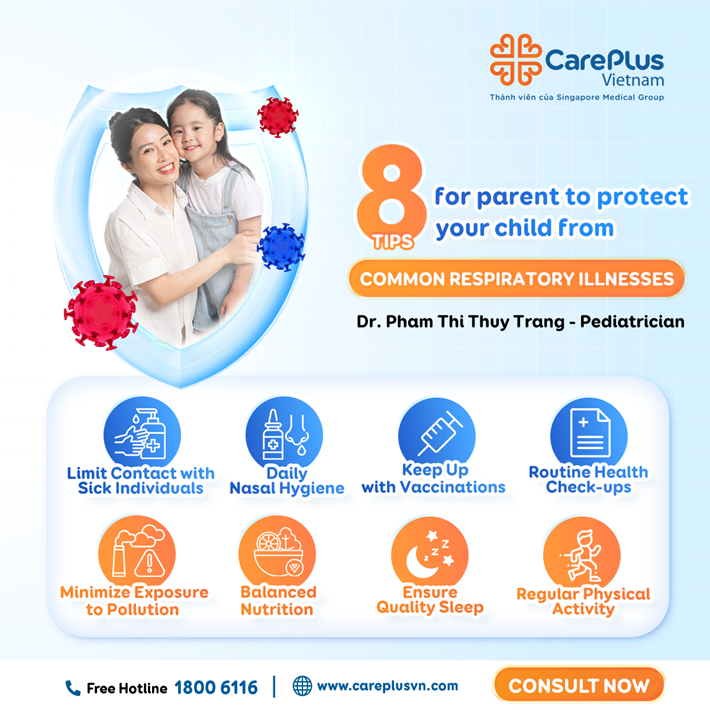8 TIPS FOR PARENT TO PROTECT YOUR CHILD FROM COMMON RESPIRATORY ILLNESSES DURING SEASONAL CHANGES
During seasonal transitions, children are more prone to respiratory illnesses such as upper respiratory tract infections, laryngitis, bronchiolitis, pneumonia, and asthma. These conditions can be triggered not only by sudden weather changes and an underdeveloped immune system but also by preventable factors. Here are ways to support your child's respiratory health:

11/12/2024 9:28:02 AM
1. Minimize Exposure to Pollution
From the early months in the womb, the respiratory system begins to form and develop. Research shows that a child’s respiratory system can be weak if the mother lives in a polluted environment (dust, fine particles, cigarette smoke, etc.). Therefore, pregnant women should limit exposure to air pollution such as dust, fine particles, and cigarette smoke.
For children, if they need to be taken outside, it is best to go early in the morning when the air is least polluted. Additionally, prepare masks or anti-pollution respirators for children when going outdoors. Keep the living environment at home well-ventilated and consider planting more green plants to reduce CO2 levels.
2. Balanced Nutrition
Encourage a well-rounded diet from an early age, including foods rich in protein, colorful vegetables, dairy, and whole grains. These foods are high in vitamins and anti-inflammatory properties that strengthen the respiratory system. Avoid fried and heavily processed foods.
3. Ensure Quality Sleep
Make sure your child gets sufficient sleep and avoid meals (except water) at least 2 hours before bedtime to keep their respiratory system healthy.
4. Regular Physical Activity
Support lung and heart health through daily physical activities. Establish a set exercise time that suits your child’s age, gradually increasing the activity level as they grow.
5. Limit Contact with Sick Individuals
Reduce your child’s exposure to people with colds or other illnesses to minimize the risk of infection. Teach them good hygiene habits, like frequent hand washing and wearing a mask when necessary, to protect their respiratory system.
6. Daily Nasal Hygiene
Clean your child’s nose with saline solution 1-2 times a day to remove dust and keep their airways clear.
7. Keep Up with Vaccinations
Ensure that your child and their caregivers are up-to-date with vaccinations to help prevent respiratory illnesses.
8. Routine Health Check-ups
Take your child for regular health check-ups, especially if they have a history of asthma or allergic rhinitis. This helps parents stay informed about their child’s development, identify any warning signs, and know how to respond appropriately during an asthma attack or other issues.
Protecting your child from respiratory illnesses not only keeps them healthy but also builds a strong foundation for confident learning and exploration.